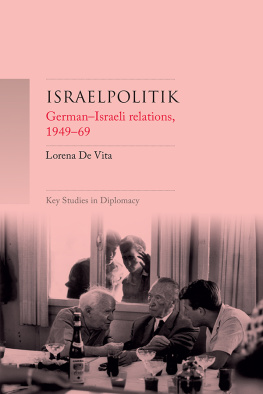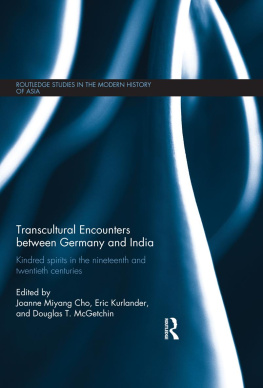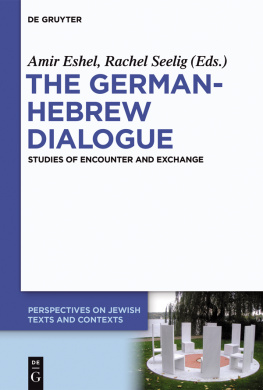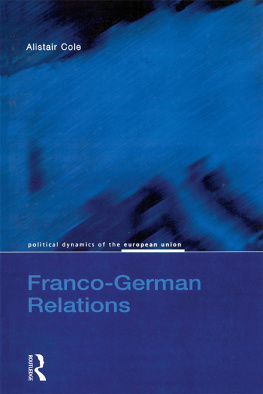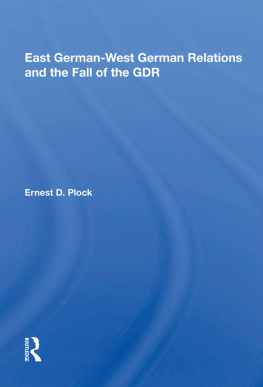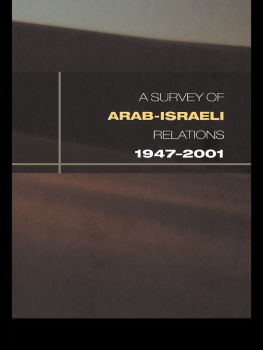Key Studies in Diplomacy
Series Editors: J. Simon Rofe and Giles Scott-Smith
Emeritus Editor: Lorna Lloyd
The volumes in this series seek to advance the study and understanding of diplomacy in its many forms. Diplomacy remains a vital component of global affairs, and it influences and is influenced by its environment and the context in which it is conducted. It is an activity of great relevance for International Studies, International History, and of course Diplomatic Studies. The series covers historical, conceptual, and practical studies of diplomacy.
Previously published by Bloomsbury:
21st Century Diplomacy: A Practitioners Guide by Kishan S. Rana
A Cornerstone of Modern Diplomacy: Britain and the Negotiation of the 1961 Vienna Convention on Diplomatic Relations by Kai Bruns
David Bruce and Diplomatic Practice: An American Ambassador in London, 19619 by John W. Young
Embassies in Armed Conflict by G.R. Berridge
Published by Manchester University Press:
Reasserting America in the 1970s edited by Hallvard Notaker, Giles Scott-Smith and David J. Snyder
Human rights and humanitarian diplomacy: Negotiating for human rights protection and humanitarian access by Kelly-Kate Pease
The diplomacy of decolonisation: America, Britain and the United Nations during the Congo crisis 196064 by Alanna OMalley
Sport and diplomacy: Games within games edited by J. Simon Rofe
The TransAtlantic reconsidered edited by Charlotte A. Lerg, Susanne Lachenicht and Michael Kimmage
Academic ambassadors, Pacific allies: Australia, America and the Fulbright Program by Alice Garner and Diane Kirkby
A precarious equilibrium: Human rights and dtente in Jimmy Carters Soviet policy by Umberto Tulli
US public diplomacy in socialist Yugoslavia, 195070: Soft culture, cold partners by Carla Konta
Copyright Lorena De Vita 2020
The right of Lorena De Vita to be identified as the author of this work has been asserted by her in accordance with the Copyright, Designs and Patents Act 1988.
Published by Manchester University Press
Altrincham Street, Manchester M1 7JA
www.manchesteruniversitypress.co.uk
British Library Cataloguing-in-Publication Data
A catalogue record for this book is available from the British Library
ISBN 978 1 5261 4781 3 hardback
First published 2020
The publisher has no responsibility for the persistence or accuracy of URLs for any external or third-party internet websites referred to in this book, and does not guarantee that any content on such websites is, or will remain, accurate or appropriate.
Cover image: The State visit of German Chancellor Konrad Adenauer to Israel, visiting David Ben Gurion in the dining room of his Kibbutz at Side Boker, 1966 Micha Bar-Am, Magnum Images
Typeset by Newgen Publishing UK
It is with great joy and deep gratitude that I acknowledge the individuals and institutions whose support has been crucial to the publication of this book. For financial support, I thank the Aberystwyth University Postgraduate Research Fund; the German Academic Exchange Service (Deutscher Akademischer Austauschdienst); the German History Society; the Partners in Confronting Collective Atrocities Group; the Society for Historians of American Foreign Relations; the Postdoctoral Fellowship Fund of the Foreign Ministry of the State of Israel; the Memorial House of the Wannsee Conference Joseph Wulf Fellowship Fund; and the Research Institute at the Department of History and Art History at Utrecht University. All of these provided fundamental resources that allowed me to conduct the research for this book across Europe, the United States and the Middle East.
I thank the University of Roma Tre for having granted me, in the very distant past, a scholarship to conduct research abroad to write my undergraduate dissertation on German foreign policy that experience had a profound impact on me, and the double effect of both rewarding and further unleashing my intellectual curiosity. I would have never embarked upon this journey without Leopoldo Nutis lectures, which introduced me to a wonderful and complex subject, la storia delle relazioni internazionali, which I now teach at Utrecht University and where I am proud to be a member of a wonderful group of historians who made me feel welcome in the Netherlands from my very first day. In particular, I am grateful to the members of the History of International Relations section, and especially to Beatrice de Graaf, Laurien Crump, Jacco Pekelder, Liesbeth van de Grift and Jolle Demmers; to research director Oscar Gelderblom and research coordinator Tom Gerritsen; and to the successive directors of the Department of History and Art History, Leen Dorsman, Josine Blok and Maarten Prak, for having supported me in countless ways.
Pursuing my studies at the London School of Economics and at Aberystwyth University taught me more than I could have hoped for. I am especially grateful to Campbell Craig and R. Gerald Hughes, for their unwavering confidence in this project and in my abilities to pursue it successfully. Jenny Edkins, Kamila Stullerova, Jan Ruzicka, Peter Lambert, Claudia Hildebrand and Sergey Radchenko all provided helpful guidance. At the LSE International Relations Department, I was greatly inspired by conversations with Fawaz Gerges, Kristina Dalacoura, Christopher Coker, George Lawson and Ulrich Sedelmeier, and I would have not embarked upon my research without Kimberly Hutchings gentle encouragement.
Visiting research fellowships in Germany and Israel were, in innumerable ways, crucial in allowing me to develop the argument of this book. At the Jena Center for 20th Century History I was immersed in a lively research environment which profoundly shaped my thinking on German contemporary history. I was greatly inspired by my conversations with Norbert Frei, Kristina Meyer, Dominik Rigoll, Tobias Freimller, Jacob Eder, Janine Gaumer and Annette Weinke, and it is with pleasure that I note that many of these conversations are still ongoing. At the Joseph Wulf Library of the Memorial House of the Wannsee Conference, I have greatly benefited from conversations and exchanges with Hans-Christian Jasch, Christoph Kreuzmller and Monika Sommerer. During my time in Israel, I have learnt a great deal from Moshe Zimmermann, Yehuda Bauer, Manuela Consonni, Juliane Brauer, David Witzthum, Guy Laron, Tibor Shalev-Schlosser, Shlomo Shpiro, Hilla Lavieh and Irit Chen. I am in great debt to all the members of the Richard Koebner Minerva Center for German History at the Hebrew University in Jerusalem, but in particular to Ofer Ashkenazi, who provided me with moral, logistical and intellectual support as well as a desk with the most beautiful view of Jerusalem I ever could have imagined, which turned out to be a perfect location for me to finish writing this book.
I am very grateful to all the archivists in Germany, Israel, the UK, the Netherlands, Italy, Austria and the United States who have helped me with my research.
The conversations with eyewitnesses and archivists, as well as with colleagues, friends and mentors, have been a constant source of inspiration. I owe special thanks to Andrew Monaghan, Fawaz Gerges, Oliver Rathkolb, Mark Kramer, Holger Nehring, Stephan Malinowski, Jeffrey Herf, Sybille Steinbacher, Emile Chabal, Roham Alvandi, Piers Ludlow, Jonathan A. Bush, Giles Scott-Smith, Donald Abenheim, Judith Keilbach, Galia Golan, Cian ODriscoll, Sielke B. Kelner, Turlach O Broin, Ivor Bolton, James Hershberg, Markus Grannson, Aidan Condron, Corina Mavrodin and Ned Richardson-Little. Throughout the years, I have had the privilege of sharing my ideas

